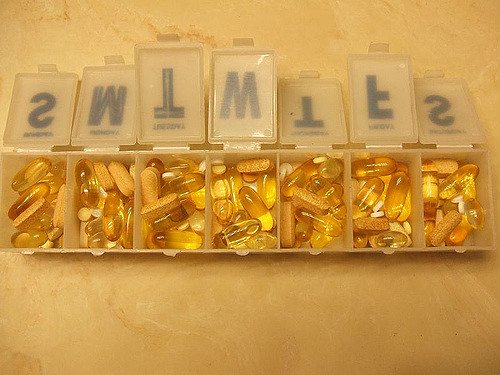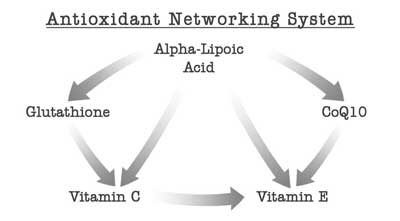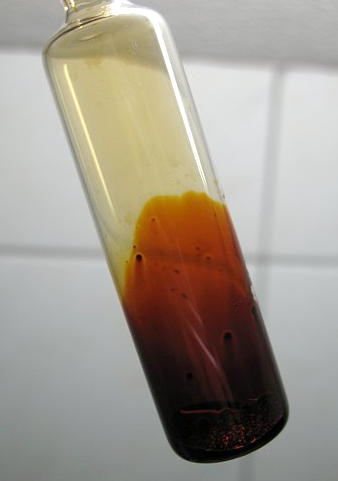Research utilizing combined data from 17 studies that included more than 12,000 people from the U.S., Europe, and Asia found that optimal levels of vitamin D for colon cancer prevention are higher than the current U.S. recommendation of 600 international units (IU) per day. by Joe Battaglia In the absence of Vitamin D from sunlight, disease increases more than 1000 percent. Experts suggest that the chances of getting vitamin D from your diet are very low. Humans make 90 percent of our vitamin D naturally from sunlight exposure to our skin — specifically, from ultraviolet B exposure to the skin, which naturally initiates the conversion of cholesterol in the skin to vitamin D3. Theories linking vitamin D deficiency to certain cancers have been tested and […] Read More
Category: Vitamins & Supplements

With so much information circulating out there about nutrition, it can be challenging to make sure you’re getting the nutrients you need each day. In fact, with some sources listing as many as 90 essential nutrients, following a balanced diet can quickly become overwhelming. However, getting all the nutrients you need doesn’t have to be complicated. In fact, by just being mindful about a few specific nutrients, eating a healthy diet full of nutrient-dense foods can be pretty simple. Breaking it down into essential versus nonessential nutrients can help simplify and streamline your diet, making it easier than ever to achieve better health. But what are those nutrients, and what do nutrients do, anyway? Let’s take a look at the 11 essential nutrients your body […] Read More

Differences in the bacterial make up of breast tissue in those with breast cancer point to the existence of a “microbiome” within the breast as well as the prospect of probiotic use in the battle against this disease. There are over 400 species of bacteria in your belly right now that can be the key to health or disease. Health care of the future may include personalized diagnosis of an individual’s “microbiome” to determine what probiotics are needed to provide balance and prevent disease. Findings from the US study reveal healthy breast tissue contains more of the bacterial species Methylobacterium, a species known to produce phytohormones that exert an anti-cancer effect. “To my knowledge, this is the first study to examine both breast tissue and […] Read More

Vitamin E is a vital antioxidant that can prevent free radical damage to specific fats in the body, naturally slowing down the aging process. As an important fat-soluble vitamin, Vitamin E plays an essential role in the proper functioning of the body’s organs, the activity of enzymes and numerous neurological processes. Choosing to eat more foods rich in Vitamin E is ideal as they can help to treat and prevent diseases of the heart and blood vessels. Vitamin E is found in abundance in fruits, nuts, seeds, grains, oils and wheat germ, along with being widely available as a supplement. Here are several of the best reasons to include more Vitamin E in your diet… 1. Improves Vision Vitamin E may help with decreasing the […] Read More

Most people think vitamin C is helpful to fend off colds, sore throats and sinus infections. Though vitamin C certainly boosts immune system functionality, it does plenty more for the human body. Recent research indicates this vitamin is also important in the quest to combat cancer. Though there are numerous cancer therapies available, the majority cause unpleasant side effects. Some such treatment modalities are even toxic. In certain cases, cancer does not respond to the treatment modality, leaving doctors puzzled as to the next course of action. At the moment, the medical community believes cancer stem-like cells are responsible for cancer’s return and metastasis. This is precisely why doctors and cancer patients across the globe are welcoming vitamin C as a cancer cell-killer with open […] Read More

For centuries, vinegar has been used for various household and cooking purposes. It is also an ancient folk remedy, claimed to help with all sorts of health problems. The most popular vinegar in the natural health community is Apple Cider Vinegar. It is claimed to lead to all sorts of benefits, some of which are supported by science. This includes weight loss, lower blood sugar levels and improved symptoms of diabetes. Here are 6 health benefits of apple cider vinegar, that are supported by scientific research. 1. High in acetic acid, which has potent biological effects Vinegar is made in a two-step process, related to how alcohol is made (1). The first step exposes crushed apples (or apple cider) to yeast, which ferment the sugars […] Read More

Your body is like a finely tuned biological clock. And there’s an important nutrient that can help it “take a licking” as the old Timex commercial used to say, and protect you from cancer, heart disease, inflammation and other maladies. The nutrient is lipoic acid. According to scientists at Oregon State University, lipoic acid resets the body’s internal clock (its circadian rhythm) improves the heart’s response to stress, keeps your hormones in balance, helps muscles perform more efficiently, balances blood sugar and slows the aging process. Lipoic acid is a potent antioxidant used for aerobic metabolism. The best food sources include leafy vegetables like broccoli and spinach as well as organ meats. “This could be a breakthrough in our understanding of why lipoic acid is […] Read More
Stroke patients with low vitamin D levels were found to be more likely than those with normal vitamin D levels to suffer severe strokes and have poor health months after stroke, according to research presented at the American Stroke Association’s International Stroke Conference 2015. Low vitamin D has been associated in past studies with neurovascular injury (damage to the major blood vessels supplying the brain, brainstem, and upper spinal cord). “Many of the people we consider at high risk for developing stroke have low vitamin D levels. Understanding the link between stroke severity and vitamin D status will help us determine if we should treat vitamin D deficiency in these high-risk patients,” said Nils Henninger, M.D., senior study author and assistant professor of neurology and […] Read More

A great feeling of security for a parent comes from administering a medicinal like iodine. It is what I give my children instead of dangerous antibiotics when they are sick. It is what I use when the first symptoms of flu approach and it does spare one the worst of that misery. After we understand that iodine is an excellent antiviral, antibacterial, anti fungal, mold and yeast agent we begin to glimpse the catastrophic mistake made for substituting pharmaceutical antibiotics for iodine. Antibiotics do not kill yeast but they certainly can kill people on occasion.[1] Not only do some antibiotics increase the risk of sudden cardiac death but sometimes they lead to liver compromise and failure. Despite the ever-widening use of antibiotics the National Center […] Read More

(NaturalHealth365) The value and impact of a daily vitamin C supplement as well as high, concentrated doses for acute illnesses is becoming increasingly clear. Studies have already shown the efficacy of liposomal vitamin C in treating infections and as an anti-cancer therapy. Now, another study is confirming its effectiveness against inflammation in cancer patients, one of the primary markers. High levels of inflammation seem to indicate a higher risk of cancer as well as a less hopeful prognosis for healing and recovery. Inflammation impairs the immune system, plays a role in cachexia, lowers toleration of numerous cancer treatments, and generally decreases health and quality of life. Warning: Chronic inflammation is one of the primary markers of cancer The inflammatory response plays a major role in […] Read More
